-
Company
-
Sustainability
-
Investors
- Insights
- Innovation
-
Media
- Contact us
Sustainability
- Home
- Insights
Research & Strategy
The Research & Strategy Division produces analyses of the real estate markets, the economy and capital trends. Its role is to develop the most effective tools and strategies possible for Praemia REIM’s investors.
NEW - European Real Estate Convictions Q2 2025
NEW - European Real Estate Convictions Q2 2025
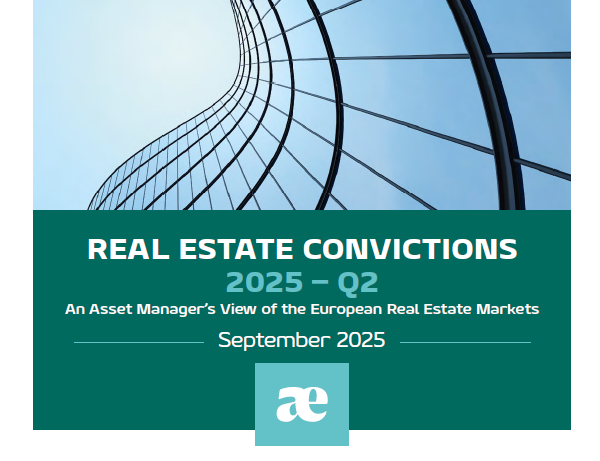
An Asset Manager's view on the European Real estate Market.
PERSPECTIVES

While a violent recession and financial crisis were avoided despite the historic rise in key interest rates by the world’s major central banks, the economies experienced a soft landing in 2023.
All our publications
Document
![]()
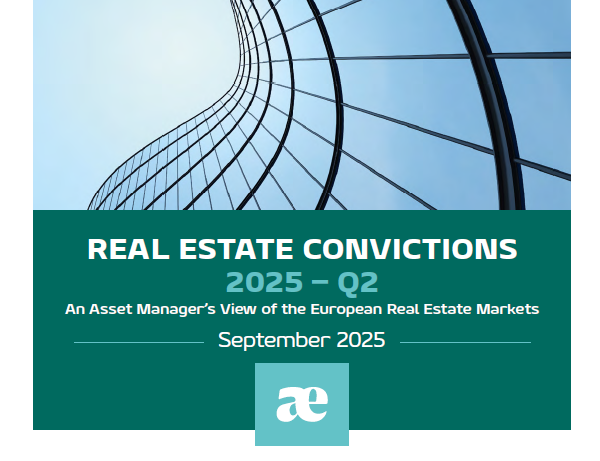
Market overview
22/09/2025
Document
![]()

Market overview
22/07/2025
Document
![]()
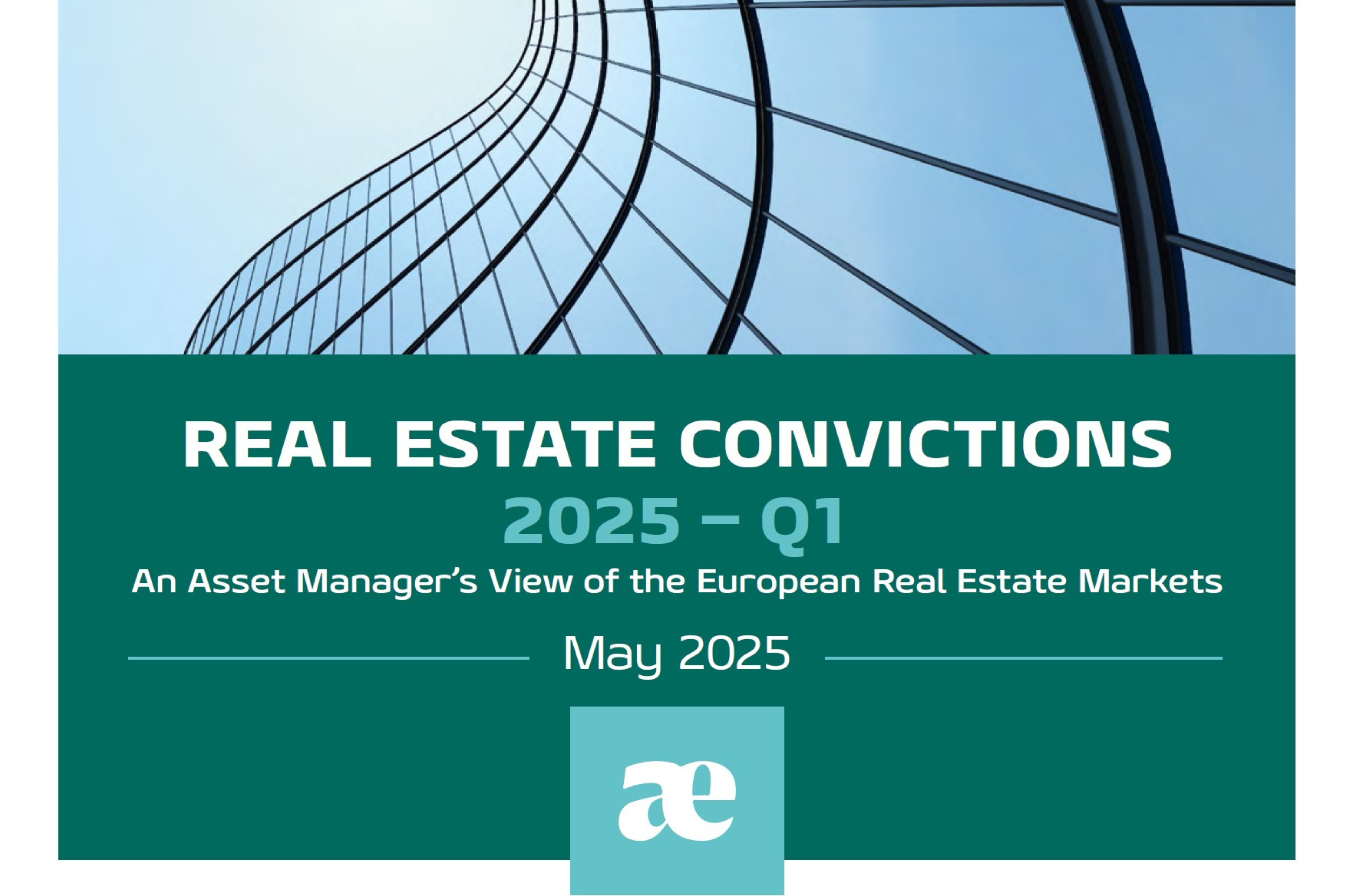
Market overview
31/05/2025
Just as the global economy appeared to have regained a degree of stability, uncertainty intensified when the U.S. administration opted to raise tariffs on the rest of the world, sending stock markets into turbulent zones. Negotiations are ongoing to find solutions. At the same time, the prospect of potential interest rate cuts by central banks has gradually increased investors' appetite for real estate—particularly in Europe—viewed as an asset capable of delivering a steady income return.
Document
![]()
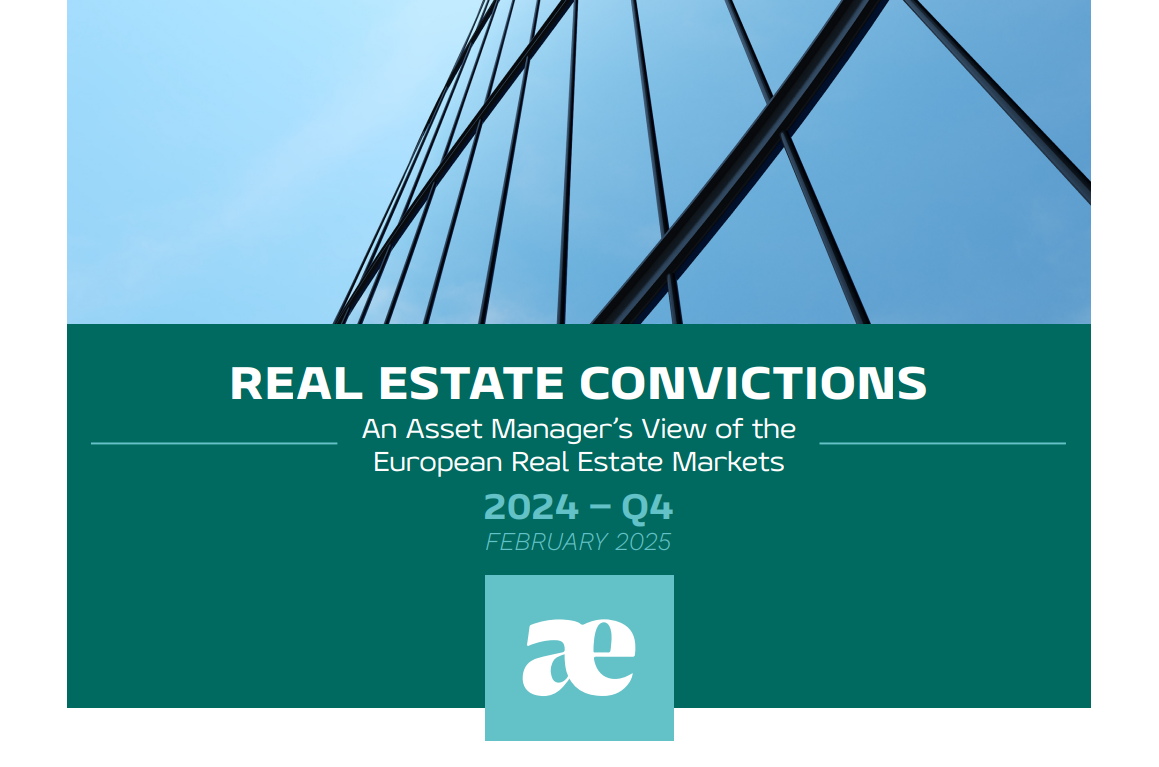
Market overview
10/02/2025
While the current fragmentation of the political landscape in several of the world’s major economies is ’detrimental’ to government effectiveness, we are maintaining our scenario of a pivotal 2024 leading to a gradual recovery in the European real estate sector during 2025. The continued reduction in ECB interest rates, the level of savings amongst Europeans and the recovery of the real estate markets between 2022 and 2024 all point to the potential for improvement and a rebound in the sector.
Document
![]()

Market overview
12/11/2024
Global growth forecasts currently stand at +3.2% for 2024 and are expected to remain at this level the following year. For now, the “soft landing” scenario remains the most likely, as the likelihood of a global recession continues to diminish.
However, several risks persist. GDP growth could be hampered by a lack of productivity gains in the coming years. The potential escalation of regional conflicts remains a concern, and the resurgence of trade and industrial protectionism continues to cast a shadow over long-term growth prospects.
Document
![]()

Market overview
10/10/2024
Document
![]()

Market overview
01/08/2024
Despite the uncertainties, the global economy showed remarkable resilience in the first six months of 2024. However, growth remains uneven, and difficulties persist. At the same time, the economic upheavals of the past four years should gradually ease. Global growth forecasts currently stand at +2.6% for 2024, before a more dynamic recovery in 2025 (+2.8%).
Document
![]()

Market overview
02/05/2024
While uncertainty dominated during the first months of the year 2024, it would seem that the worst time for global growth has passed. Indeed, the possibility of a US recession following the monetary tightening seems to be ruled out due to the resilience of the economy. Similarly, the latest figures for Chinese growth have been better than initially anticipated, although they remain low compared to recent years. Thus, global growth is forecast at +2.4% for 2024, before a more dynamic recovery in 2025 (+2.8%).
Document
![]()

Market overview
11/03/2024
The real estate crisis, stemming from the surge in interest rates driven by escalating inflation, is not confined to Europe alone. Indeed, it also affects the other major continental blocks, such as
China or the United States. In this study, we want to offer a global perspective on the evolution of real estate markets, explore the diversity of responses provided by international players, and draw the outlines of what could be a “global real estate allocation” in the next cycle.
Document
![]()

Market overview
20/02/2024
The question that everyone is asking is the following: will we finally emerge from
the turbulent period, after several quarters of volatility in asset values? It must be
said that we have been faced with an exceptional situation of repeated shocks for
two years between high inflation, a historical increase in interest rates and a risk of
recession. The year 2024 is therefore beginning under better auspices than 2023, with
economies that have been able to effectively resist, inflation on the way to being under
control and interest rates that have reached their peak. Even if value adjustments
are still possible as long as the ECB does not reduce its key rates, 2024 will be the
year of change in real estate market conditions in Europe, provided that a new shock
does not occur.
Document
![]()
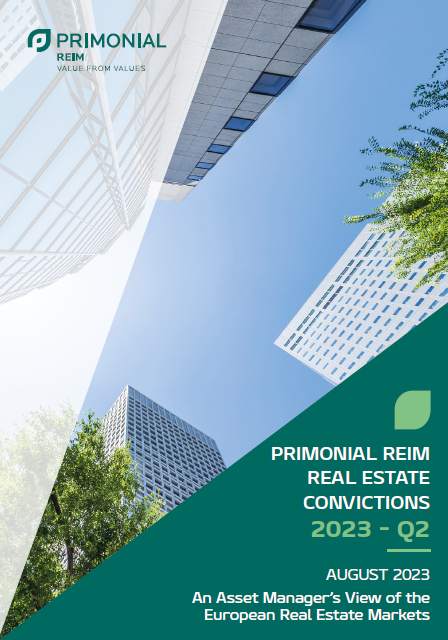
Market overview
16/11/2023
The era of repeated shocks typifies the new cycle we are now living through. Whilst it is
still difficult to assess their economic effects, the risks of an escalation of the situation
in the Middle East have fed into a nervousness in equity markets, already heightened by
mixed performances from companies. As far as real estate assets are concerned, after
an intense period of widespread corrections in response to the rapid rise in interest rates,
we are likely to see a gradual move into a stabilisation phase once the risk premium has
been rebuilt.
Document
![]()

Market overview
15/09/2023
Although considerable uncertainty persists in the short term, given the inflationary context and
geopolitical tensions, the real estate market offers solid fundamentals. The market has strong sources of support that will drive demand: demographic shifts, with challenges of an ageing
population; urbanisation as a vector of economic dynamism and net job creation; and the energy transition task that the real estate industry must tackle.
Document
![]()
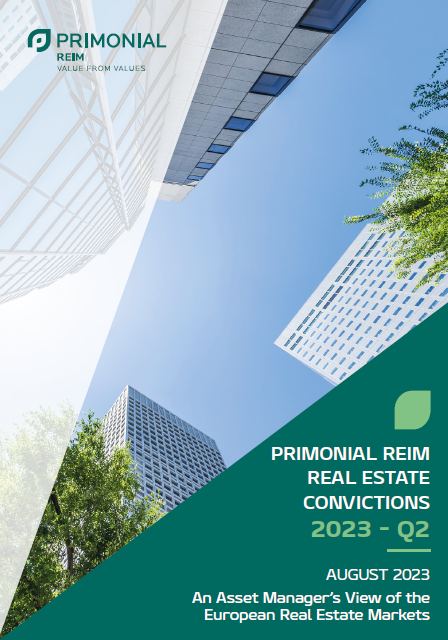
Market overview
07/09/2023
Despite persistent uncertainties, the global economy appears to be holding up better than
expected in 2023. Energy prices are moderate, demand is more evenly distributed, and supply
is stabilizing. This has led to an improvement in global growth forecasts, now reaching 3.0% for
2023 and 2024. However, risks persist for the Eurozone, and the ECB’s monetary policy decisions
will be guided by inflation developments. The ECB’s decisions have already shown positive results
in controlling inflation. Despite disparities, the healthcare, commercial, and hospitality sectors
have performed well in Europe in 2023. Rising interest rates have increased the cost of debt, but
rental yields are supporting overall performance.
Document
![]()

Market overview
16/05/2023
The unexpected resilience of the European economy has led to an improvement in the
business perspectives for 2023. However, the ECB has once again chosen to increase its
interest rates to limit the impact of inflation, which is expected to decrease by the end of
the year. For analysts, controlled inflation will enable a new, more accommodative policy
of interest rates. Regarding real estate, this situation has led investors to be more rigorous
in their allocation choices during the first quarter of 2023. At the same time, we note that
real estate assets that meet ESG criteria and are able to generate performance through
income return, particularly healthcare assets, are becoming attractive to investors
Document
![]()

Market overview
04/05/2023
The issue of energy shortage has (for the time being) disappeared from the public debate, and the bottlenecks in global supply chains, especially between China and Europe, have largely been resolved. This is reflected in a significant increase in imports and exports between Germany and China at the beginning of the year. Nevertheless, only weak economic growth of 0.3% is expected for Germany for 2023. The main reasons for this are high energy prices and continued dependence on gas supplies.
Document
![]()

Thematic report
18/04/2023
While healthcare real estate needs to be considered on a European scale to achieve a relevant investment strategy, the sector benefits from solid and encouraging fundamentals resulting from continued demographic pressure and the rapid ageing of the population. Investing in health infrastructure also means offering the possibility to all to enjoy better health and promote well-being, which are essential elements for improving the quality of life in our societies.
Document
![]()

Market overview
10/03/2023
It is generally acknowledged that office markets are comparatively sensitive to economic cycles and that demand for office space is correspondingly strongly influenced by the overall economic situation and especially job creation. At the same time, as is the case for the real estate market as a whole, adjustments take place with a time lag and an economic downturn can rarely be read off directly from real estate fundamentals. Rather, these are "creeping" processes that often first make themselves felt in the form of reduced sales speeds both in leasing and in the transaction business. Even though 2022 closed with slightly positive economic growth and forecasts for the current year are cautiously optimistic, concerns about a recession have not disappeared. But what would a recession mean for the German office property market?
Document
![]()

Market overview
13/02/2023
2022 saw a more pronounced than expected global slowdown, due to Russia’s invasion of Ukraine, rising persistence of the Covid-19 pandemic in China. Although the clouds have continued to build up over economic prospects in the early months of 2023, rays of light could start to appear in the second half of this year, with the possibility
of a recovery in 2024 now taking shape. Forecasts for global growth currently stand at 2.7% in 2023 and 3.2% in 2024.
Document
![]()

Market overview
02/02/2023
Winter is in full swing and even historically cold December weeks have not led to energy shortages or even blackouts in Germany. There is little to suggest that this situation will change in the coming months. It should therefore be noted that at least part of the energy crisis has been overcome for this winter. However, concerns about a recession have by no means disappeared. The year 2022 still closed with economic growth of 1.7%. For 2023, however, economic
output is expected to decline by 0.6%. The yield on 10-year federal bonds has now risen to around
2.6%. The risk premium for real estate is therefore melting down further. In conjunction with significantly higher construction interest rates, rising real estate yields can therefore be expected in the medium term.
Document
![]()

Market overview
17/10/2022
Document
![]()

Market overview
10/10/2022
Document
![]()

Market overview
10/10/2022
Document
![]()

Market overview
23/08/2022
With the war in Ukraine having triggered a costly crisis, the timing of any end to the conflict remains unclear. The economic repercussions of the crisis will contribute to a marked slowing of global growth in 2022 and will fuel inflation. These factors have led to a fresh downgrade in expectations of global growth to 3% for 2022, from 3.8% at the beginning of the year. Central banks are currently focusing their attention on the tools to deploy in reducing inflation. The economic cost of measures is currently less of a priority for them than the arresting of inflationary
pressures.
Document
![]()

Market overview
27/07/2022
The real estate climate plummeted dramatically in the second quarter of the year. While uncertainty still prevailed at the outbreak of the Ukraine war, this has now given way
to an extremely pessimistic underlying mood. In addition to the ongoing war in Ukraine and the associated concerns about energy shortages, the reasons include inflation,
recession risks and higher interest rates. This multitude of factors has led to a significant decline in the willingness to invest. In many cases, prices are expected to fall, resulting
in only a few transactions. Sellers, in turn, are having to adjust their purchase price expectations in some cases in order to find a buyer for their properties at all at present.
A look at the different asset classes reveals a comparatively homogeneous picture, especially when looking at the changes from May 2022 to July 2022.
Document
![]()

Thematic report
27/06/2022
During the decade from 2012 to 2021, relative international geopolitical stability and quantitative
easing policies generated abundant, low-cost liquidity, which was advantageous for real estate.
However, the emergence of a paradigm shift, most notably in inflation or policy rates, cannot
be ignored when defining a high-performance allocation strategy in the future, given current
uncertainties.
Document
![]()

Market overview
20/05/2022
Just when the world was beginning to emerge from two years of health
crisis, the Russian invasion of Ukraine has shaken up the economic cards,
and the risk of major geopolitical fragmentation of the world has become
real. This division between blocks, if it happens, could have an impact over
a long period of time. For the time being, global growth, which now stands
at 3.6% in 2022, has been revised downwards due to the war in Ukraine
and Western sanctions against Russia. Inflation, tightening monetary
policies, the deteriorating health environment in China that will lead to
new supply-chain difficulties, or the risk of a pandemic resurgence are all
factors that pose significant uncertainties for activity in 2022.
Document
![]()

Market overview
14/02/2022
After a year in 2020 affected by the economic shock of Covid-19, 2021 brought a vigorous economic recovery which created supply-chain bottlenecks. Although the global economic recovery is continuing, 2022 has already brought the first of its own economic challenges: disrupted supply chains, high inflation, record debt. Uncertainties include the impact of the Omicron variant -- which seems to have milder symptoms -- questions over the adoption of the massive ‘Build Back Better’ stimulus programme in the USA, the continued weakness in the Chinese real estate sector and the risks associated with a possible conflict between Ukraine and Russia.
Document
![]()

Market overview
03/02/2022
Document
![]()

Market overview
30/11/2021
Document
![]()

Market overview
29/11/2021
Document
![]()

Market overview
02/08/2021
More than a year after the start of the Covid 19 pandemic, around EUR 115 billion were invested in commercial real estate in the first half of 2021, again confirming the relatively good resilience of this asset class. The dynamics differ both between European countries and between the asset classes we examine in this publication: we’ll take a closer look at office, retail, residential, healthcare and hotels, in all of which we’ll also highlight the outlook the respective asset class.
Document
![]()

Thematic report
29/06/2021
Document
![]()

Market overview
26/05/2021
Infographics
![]()

Thematic report
29/03/2021
Document
![]()

Summary report
22/03/2021
The longer the Covid-19 pandemic lasts, the more it transforms our lives, and, in particular, the way we work. Companies have scaled up partial or total remote-working. A revolution in building uses, including remoteworking For the past several years now, the emerging age of access. practises and, in reaction, employers have taken another look at their real-estate policies, and employees at their lifestyles. What should we expect going forward, from the investor’s and asset manager’s viewpoint? How do we distinguish already existing long-term, and now accelerating, office trends from novelties brought on by the pandemic? Will changes be uniform or vary from country to country and sector to sector?
Load next

Henry-Aurélien Natter
Head of Research & Strategy
Follow all our news on Twitter
Find our Twitter account
@PraemiaREIM
@PraemiaREIM
-

© 2024 - Praemia REIM

 et Firefox
et Firefox 